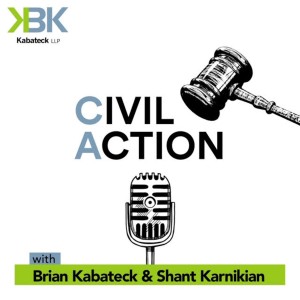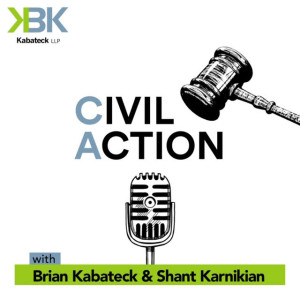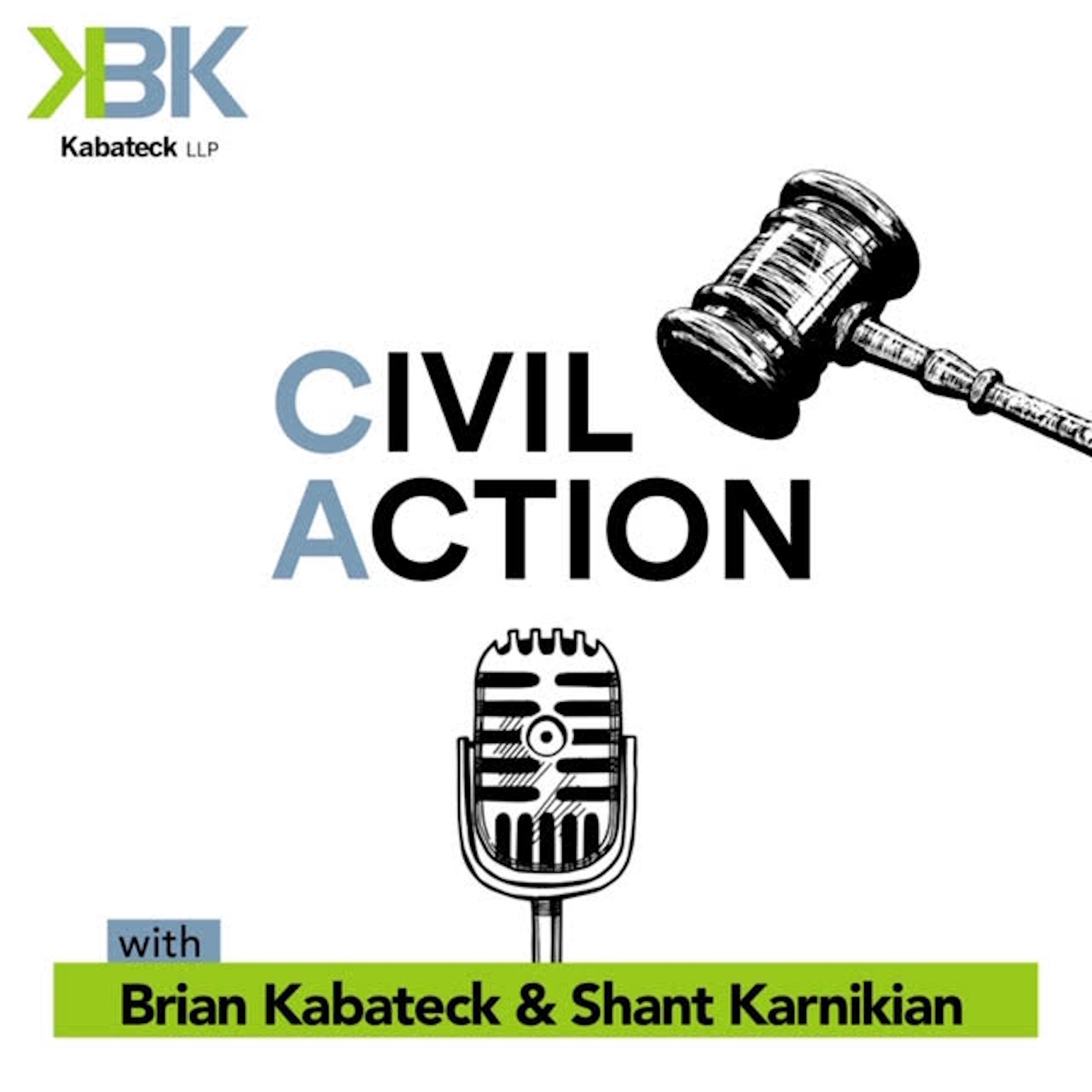Episodes

Tuesday Jan 07, 2020
Tuesday Jan 07, 2020
Andy Speilberger – Partner at Balaban and Speilberger discuss his experiences ranging from the law of national treasures to fighting insurance companies. Andy discusses his love for the movie Amadeus, his experiences traveling the world as the product of a military family, and how he and Daniel Balaban started their practice. More information about Andy Speilberger and his team can be found here: http://balaban-spielberger.com/

Thursday Jan 02, 2020
Thursday Jan 02, 2020
Brian and Shant discuss the following cases:
Legal Match.com Matter: The attorney defendant was sued by a legal referral website for unpaid bills, but counterclaimed arguing that the contact was illegal and therefore unenforceable because the company was not registered with the State Bar as a referral service. The website argued that they are not a referral service because do not screen potential clients, but rather just provided a contact list. The Court of Appeal rejected the website’s argument.
Karnofsky v. At Your Door Self-Storage: Plaintiff signed agreement with storage facility that he assumed responsibility. Storage facility also offered insurance to cover for risk of loss. The court finds that this behavior is a legal shifting of the risk and Plaintiff cannot proceed in his lawsuit for claims of water damage against storage facility.
Chen v. Los Angeles Truck Centers: Fatal bus accident involving a tour bus where a California driver from a California tour company leaves from Nevada to Arizona. The tour bus was sold by an Indiana manufacturer who was originally named in the lawsuit. Brian and Shant dissect this rather perplexing law-school-exam-like fact pattern to analyze the Court’s conclusion that Indiana law governs the case. The Court holds that the law governing the case at the outset of the litigation remains the applicable law even if a party from that state is subsequently dismissed.
County of Ventura v. Public Employment Relations Board: SCIU was to organize non-physician employees at a private medical center in Ventura. The Public Employment Relations Board reasoned that the clinic employees are joint employees of the county. The county argues that the employees are private and are not entitled to unionize. Ultimately, the control factor is the main issue – if the entity retains control over the employer it looks to factors to determine the level of control over the employee.

Thursday Dec 19, 2019
Thursday Dec 19, 2019
Brian and Shant discuss the following cases:
Dobbs v. City of LA (Convention Center): In terms of design immunity, to determine whether discretionary authority applies, a question of law, the Court states that as long as reasonable minds can differ, discretionary authority can be provided. The Plaintiff lost when arguing that the design of a bollard, a sturdy pillar used to prevent access to a structure, created a dangerous condition.
Kalta v. Fleets 101, Inc.: Kalta purchased a vehicle through his business that was for personal use and as a result, Defendant argued that Kalta was no longer a consumer and therefore does not have standing to sue under the CLRA. However, the Court of Appeal held any person who acquires goods for personal use is a consumer and thus has standing.
Eck v. City of LA (DWP): An objector at a final settlement approval hearing must have first filed a Motion to Vacate the settlement or Motion to Intervene, and if not, is not considered a party and does not have standing to appeal.
Hyundai v. Morris: It is inappropriate and an abuse of discretion to tie an attorney fee award to the amount of the prevailing parties’ damages or award. As long as the attorney fees are reasonable, fair, and justified, the fees are appropriate. However, the attorney has a responsibility to explain the details about the hours worked. Brian provides further insight by adding how the cost of litigation has routinely affected the issue of attorney fees.

Thursday Dec 12, 2019
Thursday Dec 12, 2019
Brian and Shant discuss the following cases:
CIGA v. Azar, Sec. of HHS: When Medicare has a primary claim against an insured
party and the insurer becomes insolvent, state-mandated CIGA steps in but as an
insolvency insurer not a secondary payor.
Kim v. United States: Two young boys fall victim to a deadly outcome when a tree
limb breaks loose while camping in Yosemite. Unfortunately for the family, the FTCA
bars claims deemed a discretionary function of federal officials.
Target Corp. v. Golden State Insurance: When an additional insurer seeks
indemnification, does the merit of a claim determine the outcome when the nature of
the claim is beyond the parameters of the indemnification agreement.
Ferra v. Loews Hollywood Hotel: A hotel bartender argues that compensation
provided to her for missed breaks should include the full value of the hours worked or
the premium, inclusive of non-discretionary bonuses and gratuities.

Friday Dec 06, 2019
Friday Dec 06, 2019
Brian and Shant interview Taylor Rayfield, a trial attorney at Greene Broillet & Wheeler, LLP. Taylor focuses on many aspects of plaintiffs’ litigation but has found a passion in litigating cases that involve sexual abuse. Taylor was recently named as a finalist for CAALA’s Rising Star Award, and was awarded the 2018 CAOC Street Fighter of the Year Award for settling a school sex abuse case. Taylor discusses how she discovered her passion for representing victims of sexual abuse and how she has learned to be a better trial attorney from the senior attorneys who helped guide her throughout her career. More information about Taylor Rayfield can be found here: https://www.gbw.law/team/taylor-rayfield/

Thursday Dec 05, 2019
Thursday Dec 05, 2019
Brian and Shant discuss the following cases:
Sharon v. Porter: Establishing standing in a legal malpractice cases, the statutory framework of the statute of limitations, and the importance of specifying the amount or filing a statement of damages along with a default judgment.
Sprengel v. Zbylut: Implied attorney-client relationships and the distinctions between how it applies to a relationship with the shareholders of a corporation and the corporation itself.
Henderson v. Equilon/Shell Oil: The Joint Employer Doctrine and the definition of “suffer and permit” from the landmark case of Martinez v. Combs. The ABC Test in Dynamex and how it applies to franchisees and franchisors.
Gonzalez v. San Gabriel Transit: Brian and Shant discuss whether the Dynamex Decision applies to claims retroactively, followed by a discussion of the future of the gig economy.

Monday Dec 02, 2019
Monday Dec 02, 2019
Brian and Shant sit down with Michael Childress, the newest attorney to join the Kabateck LLP team. Michael Childress focuses his practice on protecting and enforcing the rights of policyholders. Since 1981, he has negotiated, adjusted and prosecuted insurance claims arising in 40 states, successfully coordinating thousands of investigations and working with experts from many fields. Michael discusses the history of first party property insurance claims, and how almost all claims are severely underpaid. Michael shares his advice for holding insurance companies accountable and the importance of reading and understanding an insurance policy.

Thursday Nov 21, 2019
Thursday Nov 21, 2019
Brian and Shant discuss the following cases:
Salazar v. McDonald’s Corp.: Brian and Shant look at a 9th Circuit case involving the the Joint Employer Doctrine as it applies to a franchisor’s control over employees working for a franchisee.
Modaraei v. Action Property Management, Inc.: Brian and Shant discuss a holding from the California Court of Appeal in a misclassification class action where the Court affirmed the denial of class certification based on issues of predominance and superiority. The record contained evidence sufficient to support the trial court's finding that variations between the hundreds of properties the 228 putative class members were responsible for would command individual inquiries. Similarly, the evidence to support the trial court's superiority determination was largely the same as evidence supporting the predominance determination.
Abir Cohen Treyzon Salo, LLP v. Lahiji: After a client fired her attorney and his firm, the firm placed a lien on the client's further recovery. The former client’s daughter then wrote a potentially defamatory review online. The firm them filed suit against the client's daughter for defamation. The Court of Appeal affirmed the trial court's grant of the daughter's motion under the anti-SLAPP law. The court agreed with the trial court's conclusion that plaintiffs did not make a prima facie showing that the daughter was legally responsible for the Yelp review postings that underly their defamation claim.
Garcia v. Myllyla: Nine individual tenants prevailed in a jury trial against former owners of an illegally operated building on claims stemming from uninhabitable conditions in the building. Defendants were owners of a two-family residential building that they rented as 12 separate units. The Court of Appeal affirmed and held that the owners forfeited their argument that plaintiffs failed to introduce evidence of net worth; substantial evidence supported the jury's finding that defendants engaged in conduct warranting punitive damages; the punitive damages were not excessive; sufficient evidence supported the jury's award of noneconomic damages; the trial court acted within its discretion in declining to offset damages with the amounts from prior settlements; and defendants failed to show that the jury's verdict was a result of misconduct or unfair prejudice.

Thursday Nov 14, 2019
Thursday Nov 14, 2019
Brian and Shant discuss the following:
The Estate of John Steinbeck: Brian and Shant do a dramatic reading of a case arising out of John Steinbeck’s estate.
Crouch v. Trinity Christian Broadcast Center of Santa Ana: A look at whether a familial relationship can be used to temper the legal impact of comments used to establish a claim for intentional infliction of emotional distress.
JH Boyd v. Kenneth Robert Boyd: Brian and Shant discuss the direct appealability of a denial of a Motion to Compel Arbitration and the distinctions between that and a Motion to Compel Judicial Reference.
Roberts v. City/County of Honolulu: A discussion about the two-pronged approach for calculating statutory attorney fees for handling Civil Rights cases. The 9th Circuit held that a lawyer engaged in dual tracking who sets out to settle a legal matter while simultaneously working on a preliminary injunction in the same matter is deemed to recover full attorney fees for excellent results.
In Re Alpha Media Resort Investment: The steadfast five-year window (C.C.P. 583.310) to bring a matter to trial may still provide for exceptions under certain circumstances. Brian and Shant discuss these unique circumstances.

Friday Nov 08, 2019
Friday Nov 08, 2019
Brian and Shant sit down with John K. Courtney, a trial attorney with Girardi & Keese who works on a variety of different areas of practice including aviation, mass tort, and insurance bad faith. Jake has successfully litigated cases wherein he has won verdicts in excess of $20 million, and has settled matters in excess of $70 million. Jake emphasizes the importance of young attorneys getting trial experience at an early stage of their career to better equip them for the developing legal landscape. Jake is concerned with access to justice with regard to the rising cost of litigation which potentially reduces the consumer’s right to trial by jury. More information about Jake Courtney is available here: https://www.girardikeese.com/Attorneys/John-K-Courtney.shtml

